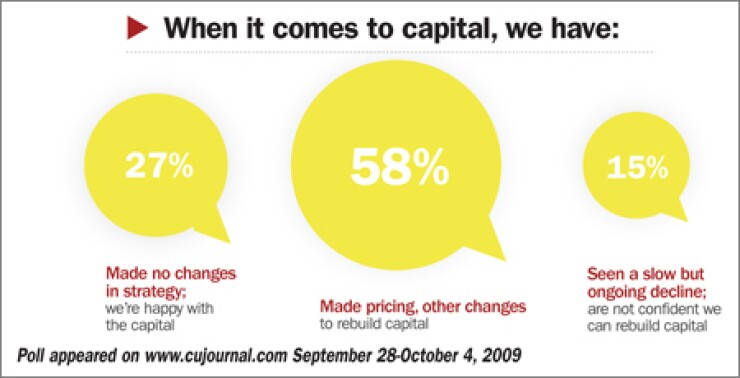
During these troubled times, we're all for new business models that look to the future and stimulate growth. Our aging membership is of particular concern here on the homefront, as is our competitive marketing and branding efforts. And there is an endless stream of webinars, email and mail bombarding us that talks about changing our ways, at least at the individual credit union level. Nothing wrong with that so long as someone is taking the long view, marshalling forces, and leading the band.
But, of late, our national leadership seems to have their heads in the clouds, fighting against issues we should be joining, like a Member Protection Agency (the word "consumer" is anathema to who we are) and CRA (which most of have always done), and proposing initiatives that only those with their head in the clouds could sniff out.
Alternative Capital is that kind of cloudy proposal for credit unions. First, it only serves the very largest credit unions, much like it did our corporates. Second, it sows the seeds of polluting our insurance fund with risks we must all bear, but only a few understand and monitor, much like our corporates did. And third, it potentially overturns the egalitarian proposition that has served us for so many years that all "members are created equal" by establishing a "preferred" class of members.
This is not to say the idea of alternative capital is bad. I would like to see risk-based capital pools available to our Members that their credit unions can offer, just not the Basel I, Federal Reserve, Big Bank adopted version that allows all sorts of exotic financial shell games that appear to dilute risk, but, in fact, do not. Our development of legitimate, manageable, credit union branded risk pools can and should be distinctly our own and cooperative in nature, not a big bank tag-alongs our national associations seem so ready adopt these days.
There is also a "beware what you wish for" category of alternative capital that can creep into this national association initiative. It is the older and more dependable alternative found in "preferred" shares, creating two or more classes of ownership. In a way, some us already have one kind of "preferred" share by offering tiered rates for higher deposits. But, all dividends are still paid together, whereas in the true "preferred scheme," the preferred share dividends are paid before and at the expense of the lesser shares. I only mention this alternative capital scheme because NAFCU and CUNA, at least in the CU Journal article ("
It may be asking alot of people with their heads in the clouds to occasionally look down at their shoes to make sure they're tied before running off across the landscape. Worse, it is presumptuous for those same cloudy headed people to think the rest of us will be down here on the ground, watching them trip all over themselves to get ahead, and then waiting to catch them when they fall. Like it or not, our roots are in the grass, where our Members live, walk, work and eat, not in the clouds. And our national credit union leaders need to come down to earth a bit more before they have a grass-roots revolt on their hands.
"Big" always seems to have been the "preferred" business model. But, today and for the foreseeable future, there are advantages to being "too small to bail." We need to be working those advantages through the creation and implementation of invigorated, cooperative credit union business models that unify our message while still allowing individual shop action-a tall order for the unimaginative and untalented mind. But, if our national leadership has that type of mind and are, if fact, banking industry followers and not credit union leaders, perhaps the state chapters and leagues should start talking to one another about the formation of a "more perfect union."
Michael Dillon, VP-marketing
South Division CU, Evergreen Park, Ill.
LETTERS TO THE EDITOR
Credit Union Journal encourages reader feedback. Letters to the Editor can be sent to Managing Editor Lisa Freeman at lfreeman@cujournal.com. Letters can also be faxed to 561-832-2939 or submitted online at www.cujournal.com.





